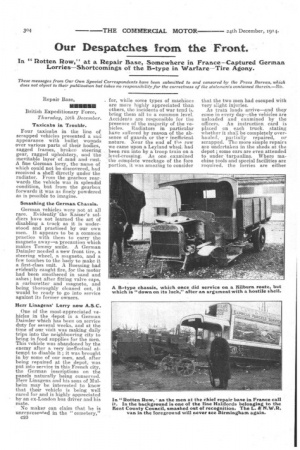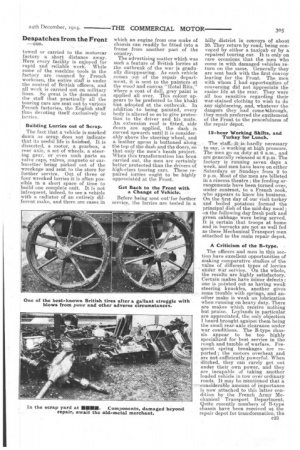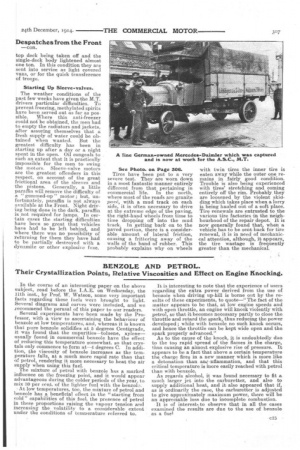Our Despatches from the Front
Page 6

Page 7

Page 9

If you've noticed an error in this article please click here to report it so we can fix it.
I "Rotten Row," at a Repair Base, Somewhere in France—Captured German Lorries—Shortcomings of the B-type in Warfare—Tire Agony.
These messages from Our Own Special Correspondents have been submitted to and censored by the Press Bureau, which does not object to their publication but takes no responsibility for the correctness of the statements contained therein.—ED.
Repair Base, British Expeditionary Force, Thursday, 10th December.
Taxicabs in Trouble.
Four taxicabs in the line of scrapped vehicles presented a sad appearance with bullet wounds over various parts of their bodies, sagged frames, broker steering gear, ragged upholstery, and the inevitable layer of mud and rust. A fine German lorry, the• name of which could not be discovered, had received a shell directly under the radiator. From the gearbox rearwards the vehicle was in splendid condition, but from the gearbox forwards it was as finely powdered as is possible to imagine.
Smashing the German Chassis.
German vehicles were not at all rare. Evidently the Kaiser's soldiers have not learned the art of disabling a truck as it is understood and practised by our own men. It appears to be a common practice with them to carry the magneto away—a precaution which makes Tommy smile. A German Daimler needed a new front tire, a steering wheel, a magneto, and a few touches to the body to make it a first-class unit. A Buessing had evidently caught fire, for the motor had been smothered in sand and ashes ; but after fitting valve caps, a carburetter and magneto, and being thoroughly cleaned out, it would be ready to go into service against its former owners.
Herr Linagens' Lorry now A.S.C.
One of the most-appreciated vehicks in the depot is a German Daimler which has been on service duty for several weeks, and at the time of our visit was making daily trips into the neighbouring city to bring in food supplies for the men. This vehicle was abandoned by the enemy after a very ineffectual attempt to disable it ; it was brought in by some of our men, and, after being repaired at the depot, was put into service in this French city, the German inscriptions on the panels naturally being conserved. Herr Linagens and his sons of Mulheim may be interested to know that their vehicle is being well cared for and is highly appreciated by an ex-London bus driver and his mate.
No maker can claim that he is unrepresented in the "cemetery," c20 for, while some types of machines are more highly appreciated than others, the incidents of war tend tA., bring them all to a common lewd, Accidents are responsible for the presence of the majority of the vehicles. Radiators in particular have suffered by reason of the absence of guards or the T inefficient nature. Near the end of the row we came upon a Leyland whia had been run into by a troop train on a level-crossing. As one examined the complete wreckage of the fore portion, it was amazing to consider that the two men had escaped with very slight injuries. As train loads arrive—and they come in every day--the vehicles are unloaded and examined by the officers. An instruction card placed on each truck, stating whether it shall be completely overhauled, partially repaired, or scrapped. The more simple repairs are undertaken in the sheds at the depot ; some cars are even attended to under tarpaulins. Where machine tools and special facilities are required, the lorries are either towed or carried to the motorcar factory a short distance away. Here every facility is enjoyed for rapid and reliable work. While some of the machine tools in the factory are manned by French workmen, the entire staff is under the control of British officers, and all work is carried out on military lines. So great is the elemand on the staff that practically all the touring cars are sent out to various French factories, the English staff thus devoting itself exclusively to lorries.
Building Lorries out of Scrap.
The fact that a vehicle is marked down as scrap does not indicate that its useful life is finished. It is dissected, a motor, a gearbox, a rear axle, a set of wheels, a steering gear, or even such parts as valve caps, valves, magneto or carburetter being picked out of the wreckage and sent to the store for further service. Out of three or four wrecked lorries it is often possible in a short space of time to build one complete unit. his not infrequent, indeed, to see a vehicle with a radiator of an entirely different make, and there are cases in which an engine from one make of chassis can readily be fitted into a frame from another part of the country.
The advertising matter which was such a feature of British lorries at the outbreak of the war is gradually disappearing. As each vehicle comes out of the repair depart. ment, is eent to the painters at
the wood and canvas "Hotel Ritz," where a coat of dull, grey paint is applied all over. This colour appears to be preferred to the khaki tint adopted at the outbreak. In addition to being painted, every body is altered so as to give protection to the driver and his mate. An extension roof is fitted, side doors are applied, the dash is curved upwards until it is considerably above the steering wheel, and a leather apron is buttoned along the top of the dash and the doors, so that only the men's heads project. When this transformation has been carried out, the men are certainly better protected than the drivers of high-class touring cars. These repaired lorries ought to be highly appreciated at the Front.
Get Back to the Front with a Change of Vehicle.
Before being sent out' for further service the lorries -are tested in a hilly district in convoys of about 20. They return by road, being convoyed by either a taxicab or by a repaired touring car. It is only on rare occasions that the men who come in with damaged vehicles return on the same. Generally they are sent back with the first convoy leaving for the Front. The men with whom I had opportunities of conversing did not appreciate the easier life at the rear. They were all too sensitive regarding their war-stained clothing to wish to do any sightseeing, and, whatever the dangers they had come %through, they much preferred the excitement of the Front to the peacefulness of the repair depot.
12-hour Working Shifts, and Turkey for Lunch.
The staff,-..iteia hardly necessary to say, is working at high pressure. The men go on duty at 6 a.m., and are generally released at 6 p.m. The factory is running seven days a week, and men have leave on. either Saturdays or Sundays from 2 to 9 p.m. Most of the men are billeted in a cinema theatre ; the feeding arrangements have been turned over, under contract, to a French cook, who appears to know his business. On the first day of our visit turkey and boiled potatoes formed the principal dish of the mid-day meal; on the following day fresh pork and green cabbage were being served. It is certain that troops at home and in barracks are not as well fed as these Mechanical Transport men attached to the main repair depot.
A Criticism of the B.type.
The officers and men in this section have excellent opportunities of making comparative studies of the value of different types of lorries under war service. On the whole, the results are highly satisfactory. Certain makes have minor defects : one is pointed out as having weak steering knuckles, another gives Rome trouble with springs, and another make is weak on lubrication when running on heavy duty. There are makes which receive nothing but praise. Leylands in particular are appreciated, the only objection I heard brought against them being the small rear-axle clearance under war conditions. The B-type chassis appear to be too highly specialized for best service in the rough and tumble of warfare. Frequent spring breakages are reported ; the motors overheat and are not.sufficiently powerful. When ditched, they can rarely get out under their own power, and they are incapable of taking another loaded vehicle in tow over ordinary roads. It may be mentioned that a considerable amount of importance is now attached to this latter condition by the French Army Mechanical Transport Department. Quite recently numbers of B-type chassis have been received at the repair depot for transformation, the top deck being taken off and the single-deck body lightened almost one ton. In this condition they are sent into service as light covered vans, or for the quick transference of troosp.s.
Starting Up Sleeve-valves.
The weather conditions of the past few weeks have given the M.T. drivers particular difficulties. To prevent freezing, methylated spirits have been served out as far as possible. Where this anti-freezer could not he obtained, the men had to empty the radiators and jackets, after assuring themselves that a fresh supply of water could be obtained when wanted. But the greatest difficulty has been in starting up after a day or a night spent in the open. Oil congeals to such an extent that it is practically impossible for the men to awing the motors. Sleeve-valve motors are the greatest offenders in this respect, on account of the great frictional area of the sleeves and the pistons. Generally, a little paraffin will remove the difficulty of " gummed-up " motor ; but, unfortunately, paraffin is not always available at the Front. Night driving being done in the dark, paraffin is not required for lamps. In certam cases the starting difficulties have been so great that vehicles have had to be left behind, and where there was no possibility of returning for them they have had to be partially destroyed with a dynamite or other explosive fuse.
See Photo. on Page 306.
Tires have been put to a very severe test. They are worn down in a most fantastic manner entirely different from that pertaining in commercial life. In the north, where most of the roads are granite pavt"., with. a mud track on each side, it is often necessary to drive at the extreme edge of the paving, the right-hand wheels from time to time dropping off into the mud track, in getting back on to the paved portion, there is a considerable amount of lateral friction, causing a frittering away of the walls of the band of rubber. This probably explains why on wheels
with twin tires the inner tire is eaten away while the outer one remains in fairly good condition. Trouble is also being experienced with tires' stretching and coming entirely off the rim. Probably they are loosened by the violent skidding which takes place when a lorry is being hauled out of a soft place. Tire renewals are entrusted to the various tire factories in the neighbourhood of the repair depot. It is now generally found that., when a vehicle has to be sent back for tire renewal, it is in need of mechaniccal attention, although, it appears' the tire wastage is frequently greater than the mechanical.


















